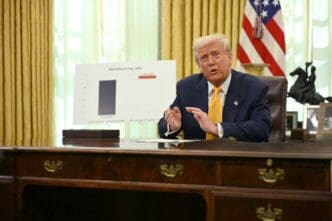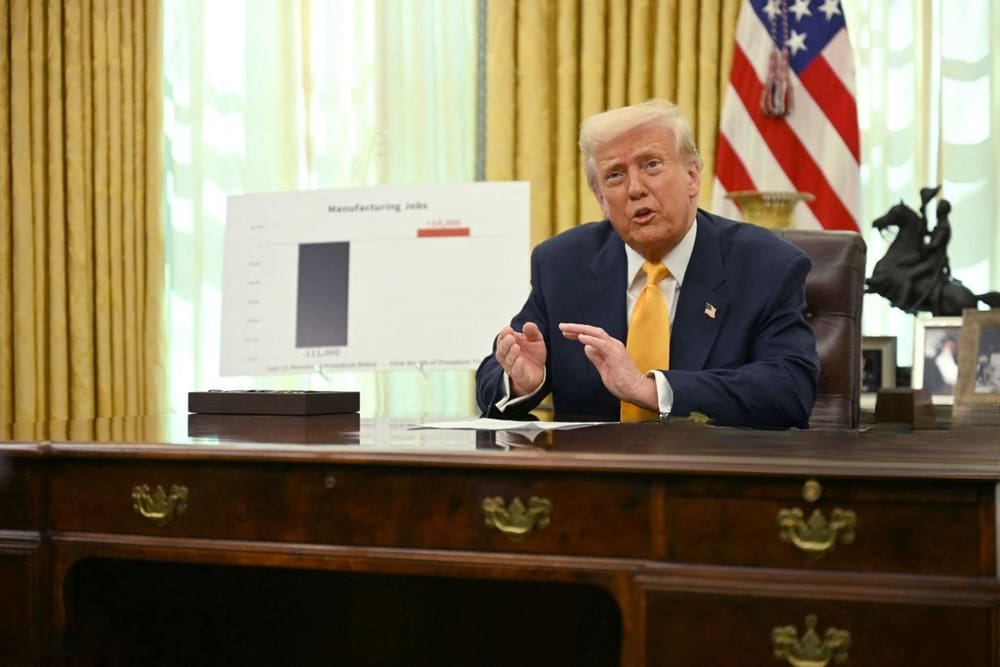Trust in President Donald Trump’s ability to strengthen the U.S. economy is waning, as a recent poll indicates that many Americans fear the country might be heading toward a recession. Concerns are particularly centered around the president’s broadly applied tariffs, which many believe will lead to rising prices. According to a poll conducted by The Associated Press-NORC Center for Public Affairs Research, about half of U.S. adults anticipate that Trump’s trade policies will significantly raise prices, while an additional three in ten think prices will increase somewhat.
The survey reveals that 47% of Americans think the tariffs will increase the prices of consumer goods significantly, with 30% expecting a moderate increase. In terms of manufacturing, 17% foresee a large increase, and 33% anticipate a moderate rise. As for employment, 13% expect a significant uptick in jobs, while 28% predict a modest increase. These findings are based on interviews with 1,260 U.S. adults conducted from April 17-21, 2025, with a margin of error of ±3.9 percentage points.
Approximately half of Americans express extreme or significant concern over the possibility of an economic recession looming in the next few months. Although skepticism about tariffs is on the rise, this does not necessarily equate to a blanket disapproval of Trump or his trade strategies. Nonetheless, it highlights potential vulnerabilities for a president who vowed to address inflation swiftly. Three months into his second term, Trump’s management of the economy and tariffs presents a potential area of weakness, with only around four in ten Americans approving of his handling of economic and trade negotiations—consistent with an AP-NORC poll conducted in March.
Matthew Wood, a 41-year-old resident of West Liberty, Kentucky, and currently unemployed, voices his apprehension over the tariffs. “I’m not a huge fan of it, especially with the back-and-forth adjustments involving China,” he said. Although he hasn’t experienced direct effects yet, Wood is uncertain about how the situation will resolve, particularly given the involvement of major global players. Disillusioned by Trump’s demeanor and his deference to advisor Elon Musk, Wood has shifted his political registration from Republican to independent, though he remains willing to give Trump until the year’s end to produce favorable tariff outcomes.
Opposition to imposing tariffs on all imported goods has increased slightly, with 52% of U.S. adults expressing discontent, up from 46% in January. This shift largely stems from younger adults under 30 who previously held no opinion on tariffs. Janice Manis, a 63-year-old retired sheriff’s deputy from Del Rio, Texas, critiques Trump for suspending tariffs temporarily for trade negotiations. “I think he shouldn’t have suspended it,” Manis remarked, noting that China is maneuvering to rally other countries against the U.S.
Less than 100 days into Trump’s second White House term, many Americans brace for possible disruptions in spending, working, and living conditions. The economy remains robust for now, featuring moderated inflation and a healthy 4.2% unemployment rate. However, indicators like consumer confidence have dropped significantly. Trump’s executive actions have reshaped the global economy, imposing hundreds of billions of dollars in new import taxes, at times suspending them, and launching trade wars, primarily with China. Financial markets fluctuate with each of Trump’s tariff announcements, leaving many Americans skeptical of his approach. The poll indicates that about six in ten people feel Trump has gone too far with new tariffs. This apprehension is mirrored by fluctuations in stock prices and rising interest rates on government bonds, which could increase costs for mortgages, auto loans, and student debt.
The president seems aware of the potential drawbacks of tariffs, recently highlighting the possibility of reaching a deal with China. Treasury Secretary Scott Bessent privately acknowledged that the situation with China is unsustainable.
Your World Now
- Impact on Grocery Prices: A significant portion of Americans express deep concern over grocery costs, which are expected to rise due to tariff policies. This could strain household budgets and alter shopping habits.
- Consumer Goods Availability: The anticipation of increased prices for consumer goods might affect buying decisions, especially for large purchases such as vehicles and electronics.
- Economic Stability: Widespread apprehension about a potential recession could dampen consumer confidence and spending, affecting economic growth.
- Job Market Fluctuations: While some foresee potential job increases, uncertainty around tariffs might deter businesses from expanding, impacting job opportunities.
- Political Sentiment Shifts: As skepticism grows, political affiliations and support may shift, potentially influencing future elections and policy directions.
- Global Trade Relations: The ongoing tariff disputes could strain international relations and impact global trade dynamics, affecting imports, exports, and overall economic interconnectedness.
Source: APNORC








